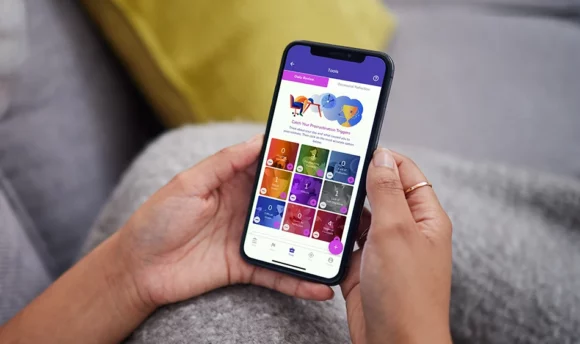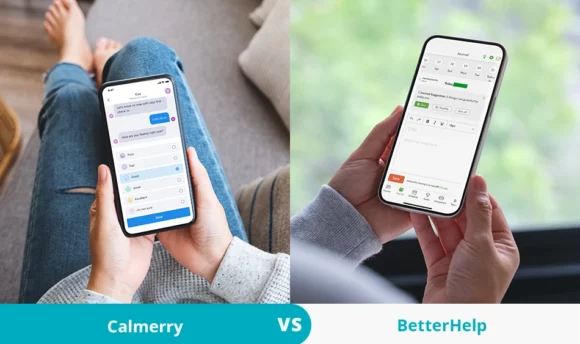How do we vet brands and products? Learn more.
The 15 Best Mental Health Apps in 2024
Ready to make 2024 the year that you finally tackle your mental health goals? Here are 15 of the best mental health apps to help
Nowadays, it seems like there’s an app for everything, and that includes improving your mental health. Many mental health apps have popped up, offering unique features aimed at improving your mental well-being at a fraction of the cost of traditional therapy.
If you’ve been considering downloading one, your first question is likely: are mental health apps effective? And if they are, how do I choose the best one?
To help make your job easier, we’ve put together a list of the best mental health apps on the market today and included more detailed information about each choice.


- Scientifically-backed mindfulness activities and meditations
- Quick relief sessions
- Includes a sharable daily mood tracker

- Offers regular sessions with a licensed therapist
- Option to receive anonymous therapy
- Possible to participate in group sessions for peer support
- Dedicated meditation sessions
- Calming exercises, breathing techniques, and sleep music with narrated stories
- Includes a Buddies feature
15 Best Mental Health Apps
The detailed overview of the 15 best mental health apps included in this next section will help make your selection process easier.
#1 Sensa

- Lessons based on the CBT method
- Mood journal
- Challenges & self-improvement activities
- Quick relief function
- Assessments to help you grow
Sensa is a mental health app that was created to treat a variety of the causes and symptoms associated with poor mental health. Using techniques commonly used in CBT, it is designed to help you improve your daily routines to relieve stress and improve your day-to-day well-being.
It’s suitable for those with ADHD, PTSD, ASD, low self-esteem, and depression. It could also benefit people who are feeling burnout symptoms, social anxiety, or are tend to procrastinate.
Their protocol begins with new users receiving a personalized 84-day plan created by a mental health professional just for them. This plan includes self-paced lessons, simple daily tasks that help you build strong routines, and activities designed to increase mindfulness.
The creators of Sansa even included thoughtful add-ons to support you on your wellness journey. Some of these additions include a mood tracker to help you record your progress, weekly self-evaluation tools, and Quick-Relief exercises that you can use in a pinch.
-
Includes a mood tracker that can be shared with healthcare professionals
-
Mindfulness activities and meditations are scientifically backed
-
Designed to provide long-term results
-
Quick-Relief sessions can help you learn to self-soothe in stressful situations
-
Extremely budget-friendly ($29.99/month)
-
Monthly subscription required
-
No one-on-one support
#2 BetterHelp

- Provides multiple ways to connect with your therapist
- Option to easily switch therapists
BetterHelp is a mental health app that was made to break all of the barriers when it comes to convenient, affordable one-on-one care.
A big selling feature of using BetterHelp is the wide variety of treatment options available for users, with mental health care being offered through texts, live chat, audio, and video calls. There’s also an option to receive anonymous therapy.
Unlike many mental health apps, BetterHelp focuses on treatment through regular sessions with a licensed therapist and doesn’t offer many additional resources.
That being said, users are also given a confidential online journal which they’re encouraged to use to track their progress. Journaling has been scientifically proven to enhance well-being and mindfulness and is a valuable resource that allows you to reflect on your wellness journey.
-
One of the most convenient options for online therapy
-
Offers financial aid for those who qualify
-
Option to remain completely anonymous
-
Group sessions available for anyone desiring peer support
-
Prices range from $240–360 per month
-
Not covered by health insurance
#3 Headspace
- Offers guided meditation sessions
- Includes low-impact workout classes
- Helps improve sleep and teaches breathing techniques
Headspace is a dedicated mindfulness app that focuses on guided meditation sessions as the main tool for improving mental well-being. Besides daily meditation, the app also offers guided audio tours for sleep, short workout sessions, ambient music, and other calming mental exercises, as well as education content.
Numerous research studies have shown that mindfulness meditation done consistently can help reduce the levels of stress, anxiety, and depression. It has also been linked to improved physical health and reduced fatigue and chronic pain.
These are the main areas that Headspace tries to tackle with daily reminders to ensure regularity. The app also includes short workout classes, as physical activities are also known to boost mental health while the Buddies feature allows users to invite their friends for extra encouragement and motivation.
-
Offers a free trails
-
Caters to beginners with single meditations
-
Sends meditation reminders
-
Workout classes taught by Olympians
-
Option to invite friends
-
Many audios are repetitive
-
Rather expensive subscription (from $12.99 per month)
#4 Calm

- Clinically proven to provide results
- Calm masterclasses provide in-depth learning
Calm uses a variety of clinically proven mindfulness-based stress reduction practices to help its users overcome the stressors of everyday life.
The app is full of features that, above all, are designed to offer stress relief, improve positive thinking, and help you get more restful sleep.
The Calm app was originally designed as a meditation app and has since branched out to include sleep stories, relaxation music, deep-breathing exercises, and 10-minute videos that guide users through gentle movements to help release physical tension.
Calm also encourages users to do regular check-ins to document their moods, how rested they feel, and things they are grateful for that day.
-
Free version is available
-
Over 100 guided meditations to choose from
-
Includes Calm masterclasses hosted by mental health professionals
-
Scientifically proven to provide results
-
Difficult to cancel the paid subscription
-
Limited features available to users
#5 Talkspace

- Covered by certain insurance companies
- Complete schedule freedom – sessions can be booked outside of regular business hours
Talkspace helps its users overcome many of the barriers to entry presented by traditional therapy. Upon signing up, users are matched with a therapist who best meets their needs with whom they can meet using live video therapy sessions.
Another benefit of using Talkspace is how easy it is to switch providers until you find the right match. With detailed descriptions, including information about each therapist’s area of expertise, you’re sure to find the therapist best suited to help you reach your mental health goals.
Talkspace could help you to deal with trauma, stress, and anxiety. Online psychiatry, including managing psychiatric medications, is also available.
Whether you prefer to meet at 9 AM or 9 PM, there’s a therapist for you. And with Talkspace’s messaging feature, you’re welcome to follow up with your provider any time you require extra support.
-
Is covered by certain insurance providers
-
Significantly more convenient than traditional therapy
-
Messaging service allows for 24/7 contact
-
Option to switch service providers until you find the perfect fit
-
Expensive without insurance ($276–516/month)
-
Zero features for support outside of one-on-one sessions
#6 iBreathe
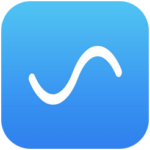
- Variety of pre-recorded breathing exercises to choose from
- Contains lessons from breathing experts
iBreathe is a simple mental health app that provides stress relief through the use of deep breathing exercises. The super simple interface is easy to use and allows users to follow along with pre-recorded breathing exercises or create their own.
The iBreathe app also offers lessons by well-known experts in the field of deep breathing, such as Wim Hof and James Nestor, and includes a feature giving users the option to set reminders throughout the day.
-
User-friendly interface
-
Provides lessons to help users learn about the benefits of breathing
-
Option to include individualized breathing exercises
-
Reminders help to keep users consistent
-
Completely free
-
Only includes breathing exercises
-
Removing ads costs $1.99
#7 eMood
- Designed to treat mental health disorders
- Export reports to share with a doctor
eMood is a mental health app that is designed to support anyone suffering from bipolar, depression, PTSD, and anxiety disorders. It aims to provide users with resources that help them identify triggers and general patterns that lead to relapses.
eMood’s secure reporting service can be used to log your mood, sleep, and daily symptoms, all of which can be easily exported and shared with your doctor.
Through the easy-to-read charts, graphs, and the insight provided by eMood, users can track their progress over time and see the improvements in their mental health.
-
Designed for anyone with pre-existing mental conditions
-
Reports are easy to share with doctors
-
Secure data storage for enhanced privacy
-
Budget-friendly (premium version for $50–100/year)
-
Not interactive
-
No resources for general mental health improvements
#8 MoodKit
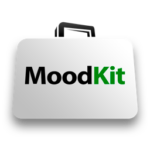
- Offers comprehensive trackers for you to document your journey
- Includes small challenges to help you overcome anxiety
MoodKit is a mental health app with a versatile design. It was created to be used in between sessions with a mental health professional or on its own to help combat negative thinking patterns.
Its straightforward design makes MoodKit an easy-to-use app that is perfect for documenting your mood in regard to everyday challenges and helping you identify daily triggers and modify your response to stressful situations.
MoodKit offers users a variety of activities. Some are designed to help you build better habits in regard to physical health; others are useful for overcoming procrastination. A unique focus of MoodKit is its activities designed to support users in improving their personal relationships.
Its comprehensive trackers and journal feature lets you easily track every step of your wellness journey.
-
Multiple wellness trackers
-
Extremely affordable (one-time fee of $4.99)
-
Provides unique journal templates for users
-
Can be used in unison with therapy sessions
-
No free version
-
App is not designed to keep users motivated
#9 Happify

- Uses practices from positive psychology to help you think more positively
- Activities are fun and engaging and don’t feel like work
Happify has helped millions of people worldwide improve their mental health and overall well-being using their engaging activities and mindfulness practices.
Unlike most mental health apps that focus on CBT practices to improve mental health, Happify focuses on the study of positive psychology. Positive psychology principles can help you overcome negative thinking and practice mindfulness without a second thought.
Though seemingly insignificant, these changes can make a big difference in regard to positive thinking, feeling more optimistic, and choosing healthier coping skills.
One of the most significant changes experienced by Happify users is their change in regard to positive thinking and go-to coping skills.
-
Free version available
-
Budget-friendly ($14.99/month)
-
Trains the brain to focus on positive thoughts
-
Activities are easy and fun to practice
-
Feels too fun and superficial for some people
-
Paid version is significantly better than the free option
#10 Quitzilla
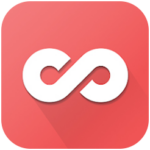
- Specifically designed to help break bad habits
- Unique rewards system helps motivate users
Quitzilla is one of the best health apps for anyone struggling with substance abuse and a strong desire to create healthier daily habits. Whether you’re struggling to quit smoking, drinking, or watching porn, Quitzilla can help.
Users are encouraged to identify their “why” for quitting and offered in-app reminders of what they gain by breaking their bad habits. Track everything from the date of your last indulgence to the amount of money you’ve saved by quitting.
Special features like Quitzilla’s Rewards Shop also incentivize users to pocket the money they would spend on their bad habits and use it instead to treat themselves at important milestones.
-
Designed to help you break bad habits
-
Increases motivation
-
Unique reward system helps incentivize good behavior
-
Premium version is required to unlock certain features
-
Doesn’t include meditations
#11 Fabulous

- Focuses on building better daily habits
- Option for one-on-one coaching
Fabulous is a science-backed approach to building habits and creating routines that help support lasting change in the lives of its users.
Created in Duke University’s Behavioral Economics Lab, Fabulous provides users with the information they need to adopt supportive daily habits. These are the same habits that have helped successful athletes and entrepreneurs rise to the top of their game.
With Fabulous, you’ll learn how to tap into your flow state, have the option to browse the coaching library for 2-minute boosts, and even connect with the online community.
-
Option for one-on-one coaching
-
Interactive user experience
-
Option to connect with the community
-
Free version
-
Free version offers limited features
-
Can be difficult to navigate
#12 MindShift
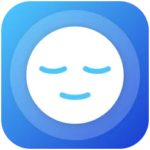
- Offers a wide variety of therapeutic techniques
- One of the only mental health apps with a community feature
MindShift is a free all-in-one mental health app offering everything from guided meditations to access to the online community.
The CBT strategies offered by MindShift help users recognize patterns that contribute to anxious thinking. The additional resources offered through the app are designed to address things like social anxiety, perfectionism, and panic attacks.
MindShift provides users with tips on building better habits and features trackers to help users record their progress on the app.
A feature unique to MindShift is its focus on goal-setting, which is scientifically proven to reduce anxious and depressive thinking.
-
Completely free
-
Focuses on the benefits of goal setting
-
Uses cognitive behavioral therapy strategies
-
Offers peer support
-
Doesn’t offer one-on-one support
-
Most resources are text-only and not interactive
#13 I Am Sober
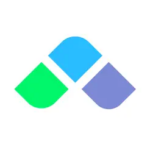
- Used to treat addiction
- Support offered through the I Am Sober community
I Am Sober is designed to support users in reaching their mental health goals through treating addiction. It provides users with motivational resources to be used in times of weakness and the opportunity to lean on the I Am Sober community for added support.
Along with tracking your sober days, I Am Sober is designed to teach its users techniques for building new healthier habits and can be used to track the amount of money you’ve saved during your sobriety.
-
Designed to support users in overcoming addiction
-
Free version available
-
Premium version is budget-friendly ($9.99/month)
-
Active community is available for peer support
-
No one-on-one coaching
-
Not interactive
-
Limited features – even in the premium version
#14 Cerebral
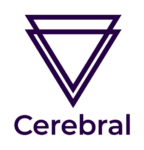
- Virtual meetings with licensed therapists and medicine prescribers
- Regular check-ins with a mental health professional
Cerebral is the best mental health app for anyone requiring steady care from a healthcare professional. Through a virtual appointment, users can meet with licensed therapists and doctors approved to prescribe anti-anxiety and depression medication.
After the initial assessment, Cerebral users are provided with a custom treatment plan, receive regular check-ins from their providers, and are given behavioral strategies to implement in-between sessions.
-
Care team can prescribe medication
-
Covered by certain insurance providers
-
Regular check-ins from service providers
-
Prescriptions are mailed to your home
-
Not budget-friendly ($99–350/month)
-
Not suitable for severe mental disorders
#15 notOK

- Used to treat addiction
- Support offered through the I Am Sober community
notOK is an app that is designed to function as a prerequisite to the national suicide prevention lifeline. It can be used in times of crisis, but instead of connecting you with a stranger, you’ll be able to receive support from your most trusted peer group.
Upon downloading notOK, users are prompted to create a list of trusted contacts. In a situation where you are feeling emotionally vulnerable, you have the option to hit the notOK panic button. Upon pressing the button, your loved ones are notified and provided with your GPS location.
notOK doesn’t stop at alerting your loved ones, though. Upon pressing the crisis button, you will also be connected to a crisis support messaging service, given deep-breathing exercises to practice, and offered additional support documents to aid you in your time of need.
-
Makes reaching out in times of need significantly easier
-
notOK provides users with a variety of supportive resources
-
Completely free
-
Not a long-term solution to mental health conditions
Comparison Table












More affordable than traditional therapy
Personalized 84-day plan
Created by behavioral psychologists
7- and 14-day free trial available depending on subscription
Dedicated meditation sessions for different mental health goals
Easy-to-use for beginners
Unlimited messaging with your therapist anytime, anywhere
Wide variety of therapists available
Free trial available
One-time payment of $4.99
Uses CBT techniques
Over 100 guided meditations to choose from
Easy-to-use interface
No subscription needed
Option for round-the-clock messaging with a therapist
Offers couples therapy
Easy to stay motivated with daily practices
Budget-friendly price of $14.99
Provides your trusted contacts with your GPS location
Completely free
Completely free
Focuses on stress relief through deep breathing
Free version available
Completely free
Features confidence-boosting challenges
Free trial available
Budget friendly ($39.99–79.99/year)
Live video sessions for more convenient care
Premium version is budget-friendly
In-depth tracking features
Free version available
Trackers make it easy to see progress
No free version
Rather expensive after the free trial
Many audio sessions are repetitive
Not covered by insurance
Therapists cannot provide medication
No one-on-one help available
Requires strong personal motivation to stay consistent
Sessions aren’t suitable for everyone
Requires significant commitment to see results
Pricey if not covered by insurance
Live sessions are limited to 30 minutes
Doesn’t help to improve mental health conditions
Free version is debatably not worth downloading
Not a long-term solution
Doesn’t improve your mental health
Free version includes ads
Only useful for breathing exercises
Only focuses on habits
No meditations
Ads in the free version can be annoying
Not interactive
Doesn’t include options for one-on-one support
Can only set daily habits
Limited features on the free version
Expensive ($99–350/month)
Limited features available for the free version
Not interactive
Limited features in the premium version
How to Choose the Best Mental Health App
When it comes to choosing high-quality products, there are certain criteria that are best used during the evaluation process.
Our team used the following criteria to ensure that only the best mental health apps made it onto this review and received the highest rating.
Quality
Quality in reference to any kind of software – apps included – refers to the quality of the code and how user-friendly it is. The best mental health apps are easy to use, free from unexpected crashes, and well-protected to keep your private information safe.
Price
You can purchase many mental health apps for a fraction of the cost of in-person therapy, a major selling point for people working with a limited budget. Finding apps that we considered budget-friendly and accessible to a wide audience was a priority for our review team.
Brand reputation
By working with reputable brands, you can ensure that your customer support journey is a smooth one. We love recommending brands we know we can trust to provide the best service possible for their customers.
Effectiveness
Debatably the most important criterion for any product you’re considering purchasing is its ability to provide results. Although mental health apps cannot change lives overnight, apps with proven results ranked higher in this review.
A Word From an MD
It’s possible that the first mental health app you download won’t be the right fit. Or that you don’t connect with the first mental health professional you meet. If this happens, don’t be discouraged!
Every service and provider in the realm of mental health specializes in something different. And there is definitely no one-size-fits-all.
Before choosing a mental health app, get clear on the goal you have for downloading one. Apps specializing in CBT will be a great choice for some people but other may see journaling apps as a better fit to improve their daily routines.
If your first choice doesn’t work out, that’s okay. There are plenty of mental health apps to choose from, and now you have even more insight into the specific features you’re looking for. With some trial and error, you’re destined to find the right match.
Conclusion
There are several benefits to choosing a mental health app over traditional therapy. The price and convenience are two of the biggest perks of using mental health apps, both of which make them more accessible to a wider audience.
Some apps offer online therapy, while others help you break bad habits. Sensa, Headspace, and BetterHelp are our top picks for 2024, but you may benefit from others on this list, too. Whatever it is that’s keeping you stuck on your mental health journey, there’s an app that can help.

















































 Select your language:
Select your language: 










